The decision to keep former president Pedro Castillo in pre-trial detention for 18 months while he is being probed on rebellion-related allegations has been maintained by Peru's top court, Al Jazeera reported.
The ruling was made public on Dec. 29, by the Supreme Court of Peru's appeals chamber as turmoil over the impeachment and removal of the former president, who attempted to illegally dissolve Congress earlier this month, continues to erupt around the nation.
In a hearing on Dec. 28, Castillo asserted that his pretrial detention had "only served to polarise our country" and that he had not committed the crimes of insurrection and conspiracy. He continued by saying that the legal process was "nothing more than political retribution."
In response to Castillo's arrest and what many perceived to be a coup attempt, widespread protests erupted throughout Peru. On Dec. 7, as the Peruvian Congress convened to vote on Castillo's impeachment, Castillo declared he would rule by decree instead.
Parliamentarians reacted to Castillo's announcement by voting decisively in favor of impeachment. Former vice president of Castillo, Dina Boluarte, was sworn in as Peru's first female leader.
Since then, she has pushed for new elections to defuse the demonstrations, which have demanded Castillo's release, her resignation, and the dissolution of Congress.
Boluarte also declared on Dec. 29, that she would assist inquiries into fatalities linked to the demonstrations and would provide "all the resources possible" to the prosecutor's office. A total of 22 people are believed to have died in clashes with the military and police. Street blockades have caused the deaths of six other people.
Several protestors were shot dead in the city of Ayacucho, according to a Reuters investigation. Human rights organizations have accused government troops of deploying weapons on demonstrators. The government has said protesters have used weapons and homemade explosives.
Since Dec. 14, Peru has been in a 30-day national state of emergency, which gives security forces extra authority. Additionally, it restricts a number of constitutional freedoms, including the freedoms of assembly and movement.
Castillo’s supporters believe the former president’s removal was part of a plot by the country’s ruling elite to punish him.
Leftist-led administrations of Mexico, Colombia, Argentina, and Bolivia have all declared support for Castillo.

© 2025 Latin Times. All rights reserved. Do not reproduce without permission.



